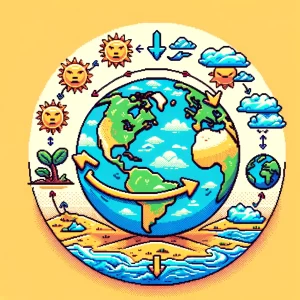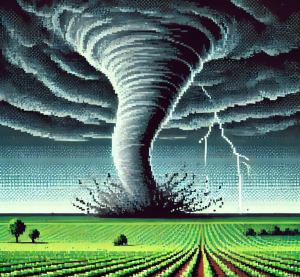
Are We Living in a New Epoch? Scientists Just Measured How Much We Know
Picture this: A future geologist cracks open the Earth’s crust and finds layers of plastic, radioactive isotopes from nuclear tests, and chicken bones—yes, chicken bones—fossilized into the rock. Welcome to the Anthropocene, a proposed new epoch where human activity has become the defining force shaping the planet. But here’s the real question: How many of us actually know we’re living in it?
Scientists have just developed a tool to measure exactly that—a test to see how well people understand the Anthropocene. The results? Let’s just say, if knowledge of our planetary impact were a pop quiz, some of us would barely pass.
The Anthropocene: The Earth’s Midlife Crisis
For billions of years, Earth has had its own natural rhythms—ice ages, mass extinctions, and meteor-induced resets. But now, we’re the ones steering the ship. Our cities, industries, and habits have altered everything from the climate to ocean chemistry, pushing us into what scientists call the Anthropocene. Unlike past epochs, which were defined by slow-moving geological processes, this one is happening in the blink of an eye.
The term was coined by Nobel-winning atmospheric chemist Paul Crutzen, who realized that our impact is no longer just local—it’s planetary. We’ve changed the air, land, and water so much that future geologists might look at this period the same way we look at the asteroid that wiped out the dinosaurs. The big problem? Most of us don’t realize the extent of these changes.
Can You Pass the Anthropocene Awareness Test?
To find out how much people actually know about our human-shaped planet, researchers in South Korea developed the Anthropocene Awareness Scale—a set of questions designed to measure how well people grasp this new reality. They surveyed 1,668 participants, ranging from 19 to 90 years old, and analyzed their responses.
The results showed that while people generally understood basic environmental issues (climate change, pollution, etc.), many still lacked awareness of the Anthropocene’s deeper implications—like how human activities have fundamentally altered Earth’s systems in ways that are irreversible.
Here’s a taste of what they tested:
- Do you believe humans have reshaped the planet on the scale of natural forces like volcanic eruptions and meteor impacts?
- Can you explain the Great Acceleration, the massive surge in human activity since the 1950s?
- Do you think we can control the Earth’s system changes, or have we passed a point of no return?
Surprisingly, many respondents hadn’t even heard of the Anthropocene, let alone understood its full impact.
Why This Matters (Hint: It’s Not Just About Saving the Planet)
You might be thinking: Okay, so humans have changed the Earth—what does that have to do with me? Well, a lot.
Understanding the Anthropocene isn’t just an intellectual exercise. It affects:
- Your health: Rising temperatures lead to more disease outbreaks and food shortages.
- Your economy: Natural disasters linked to climate change cost billions.
- Your future: We’re making irreversible changes to ecosystems, including those that provide us with fresh water, breathable air, and stable weather.
The more people recognize that we’re in a new epoch—one where our actions dictate the fate of life on Earth—the better equipped we’ll be to do something about it.
What’s Next? The Future of Anthropocene Awareness
So, where do we go from here? Researchers hope this new scale will be used to study global awareness and inform environmental policies. Governments, educators, and even activists could use this tool to gauge public understanding and create better strategies for tackling environmental crises.
But let’s get personal—where do YOU stand?
- Have you heard of the Anthropocene before today?
- What do you think is the biggest human impact on the planet?
- If you could invent one new policy or technology to help Earth, what would it be?
Let’s keep the conversation going! Share this article, discuss with friends, and drop your thoughts in the comments. After all, understanding the Anthropocene is the first step to surviving it.
Explore and Learn with Science:
Now, more than ever, we need science to guide critical decisions. Dive into groundbreaking research and inspiring stories with This Week in Science! Perfect for teachers and science enthusiasts, our free weekly newsletter gives you the tools to expand your knowledge and fight misinformation. Act now—join today to make sure science has a louder voice in shaping our future. If you liked this blog, please share it—your referrals help us amplify science’s impact.



